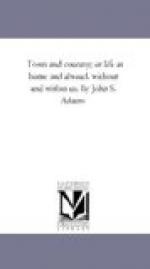The bells had-rang their nine o’clock peal; most of the stores were closed; the busy trader and industrious mechanic had gone to their respective homes, and left their property to faithful watchers, whose muffled forms moved slowly through the streets of the great city.
Not all had left their work; for, by the green and crimson light that streamed from his window, and served to partially dissipate the darkness, it was seen that he of pestle and mortar labored on, or, wearied with his labor, had fallen asleep, but to be awakened by the call of some customer, requesting an antidote for one of the many “ills which flesh is heir to.”
Other open places there were, whose appearance indicated that they were bar-rooms, for at their windows stood decanters filled with various-colored liquids. Near each of these stood a wine-glass in an inverted position, with a lemon upon it; yet, were not any of these unmistakable signs to be seen, you would know the character of the place by a rumseller’s reeling sign, that made its exit, and, passing a few steps, fell into the gutter.
In addition to these other signs, were seen scattered about the windows of these places, in characters so large that he who ran might read, “Bar-room,” “Egg-pop,” “N. E. Rum,” etc.
Those were the days of bar-room simplicities. “Saloons” were not then known. The refined names which men of the present day have attached to rum, gin and brandy, were not then in use. There were no “Wormwood-floaters” to embitter man’s life, and Jewett had not had his “fancy.”
The coach rolled on, and in a short time Edward was safely ensconced in a neatly-furnished room in a hotel known as “The Bull’s Horn.” It was indeed a great disadvantage to him that he came to a city in which he was a total stranger. He had no acquaintance to greet him with a friendly welcome; and the next day, as he was jostled by the crowd, and pushed aside by the hurried pedestrian, he realized what it was to be a stranger in a strange land, and an indescribable sensation came upon him, known only to those who have been placed in similar circumstances.
He looked around,—strange forms met his view. No one greeted him, no hand of friendship was held forth to welcome him. All the world seemed rushing on for something, he knew not what; and, disheartened at the apparent selfishness that pervaded society, he returned to his room, and wished for the quietness of his own sweet village, the companionship of his own dear Emi’.
The landlord of the tavern at which our hero had housed himself was a stout, burly man, and quite communicative. From him Edward learned much of importance. Mr. Blinge was his name. He was an inveterate smoker, and his pet was a little black pipe, dingy and old, and by not a few deemed a nuisance to “The Bull’s Horn.” This he held between his teeth, and, seating himself behind his bar, puffed away on the high-pressure principle.




